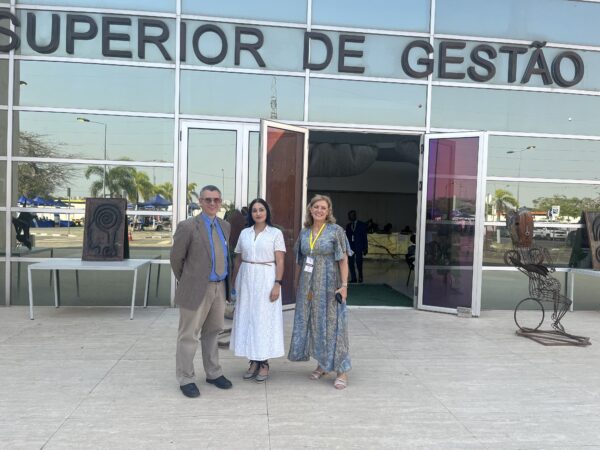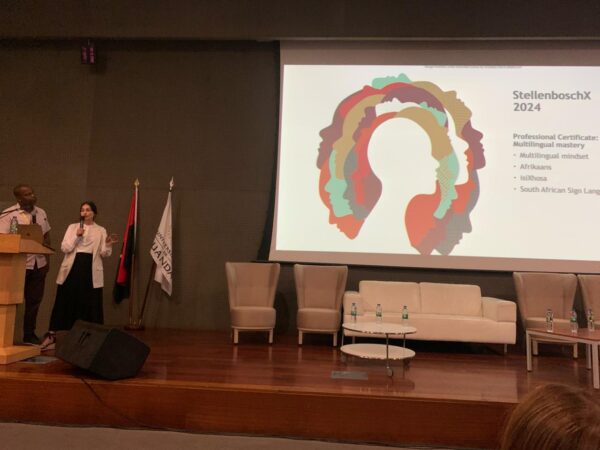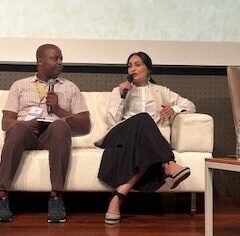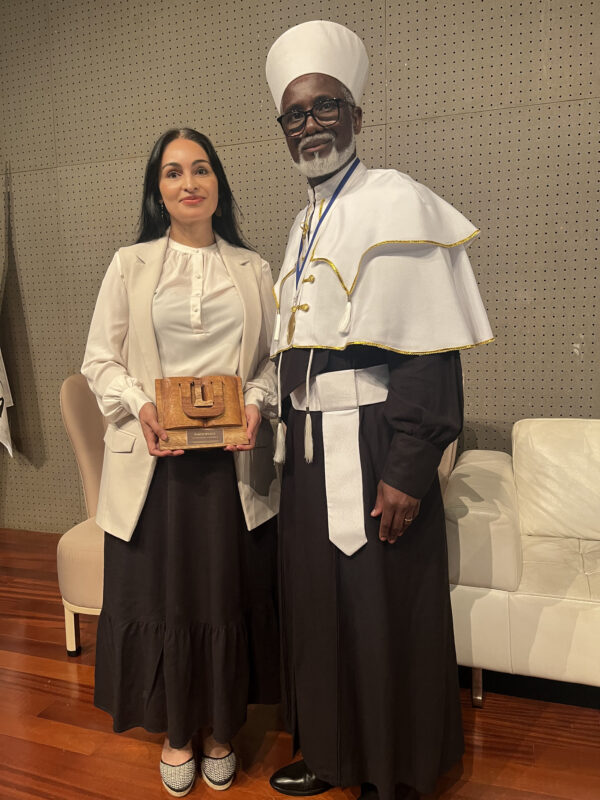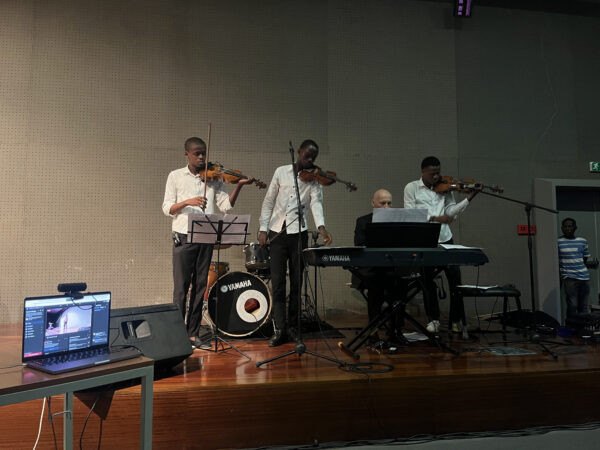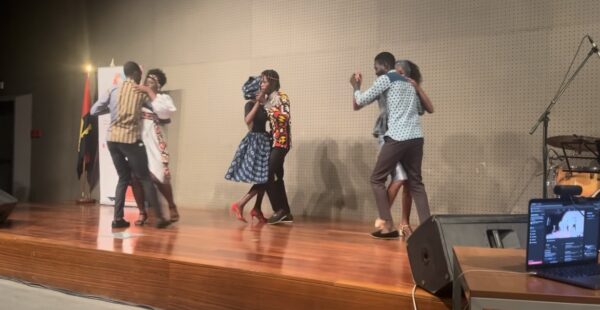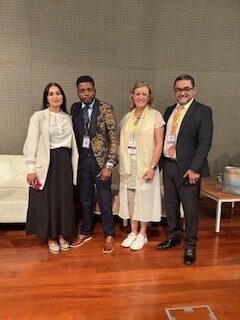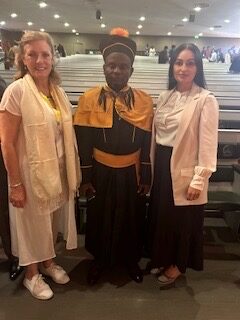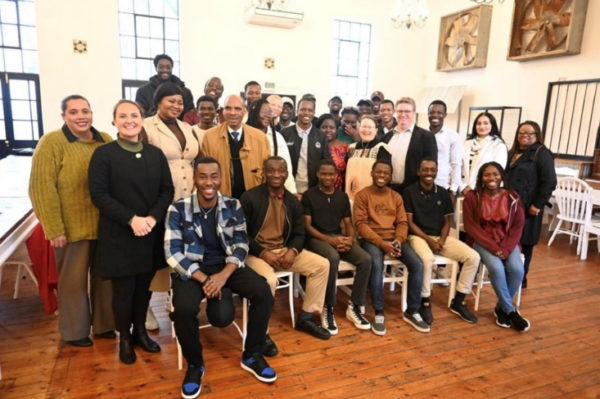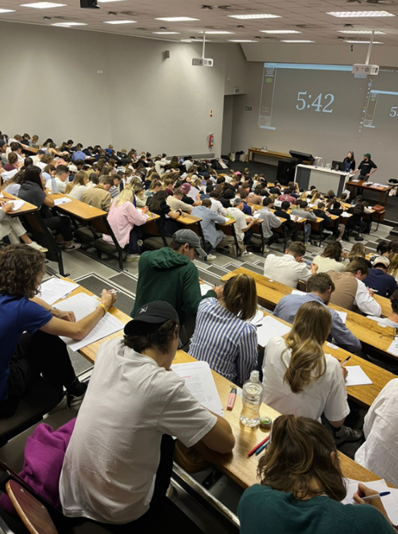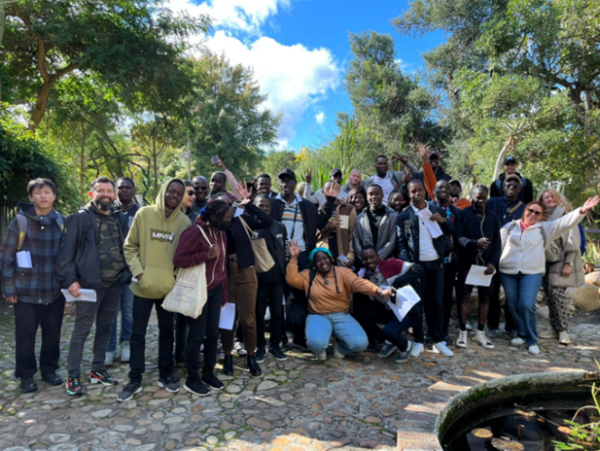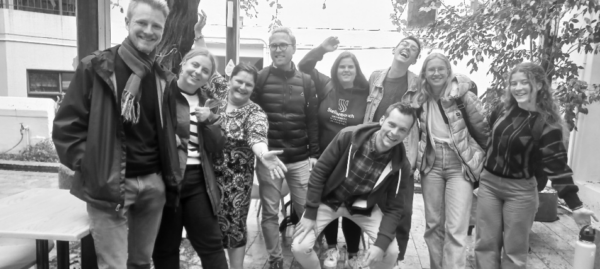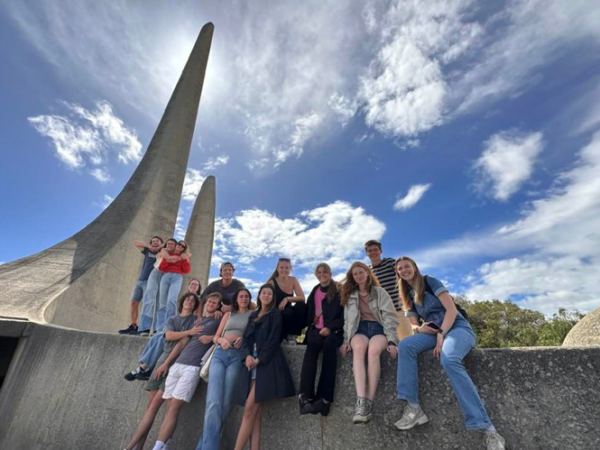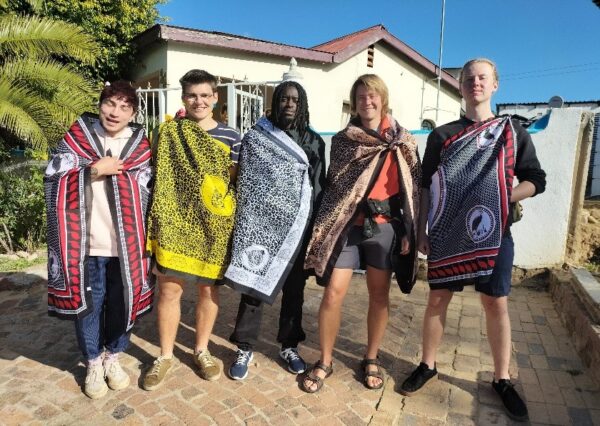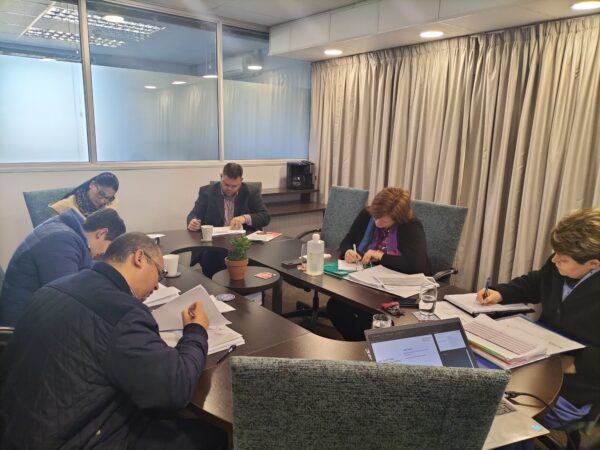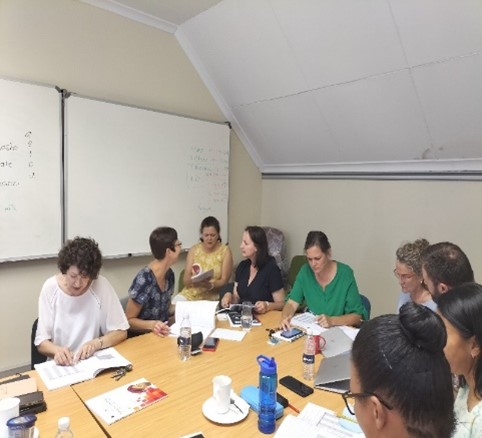What has the Language Centre been up to from May to July 2025?
Each quarter, we submit content to be considered for the SU Management Report to Senate and Council. We thought we’d also share here what the Language Centre has been up to during the last quarter (from the beginning of May to the end of July)!
1. A thriving Stellenbosch University
Promoting institutional multilingualism at SU
Stellenbosch University (SU) is committed to developing and maintaining Western Cape regional languages Afrikaans and isiXhosa as academic languages, and to give support to SASL. Promoting a multilingual mindset among students and staff forms part of the initiative to humanise the institutional culture at SU. Recent activities through the Language Centre during the reporting period are reported on below.
-
Interpreting into three languages available at new Chancellor’s installation
SASL, isiXhosa and Afrikaans interpreters at the installation of SU’s new Chancellor.
Interpreting into isiXhosa, Afrikaans and South African Sign Language (SASL) was provided by the Language Centre at the installation of SU’s new Chancellor on 20 June. Lesetja Kganyago, Governor of the South African Reserve Bank, was formally installed as the institution’s 16th Chancellor, and has been serving in the position since January 2025. The installation ceremony took place at Endler Hall.
Interpreting at such high-profile events is an important element in welcoming a multilingual audience and acknowledging the worth of the languages used.
-
Say my name workshop
On 29 May 2025, the Language Centre successfully hosted the Say My Name workshop, attended by staff members from various departments/faculties. This engaging session aimed to create awareness around the importance of correct name pronunciation as a step towards mutual respect in multilingual spaces. Participants shared that the experience was enjoyable and meaningful, with lively interaction throughout. We hope that more staff will benefit from similar sessions in future.
-
Brand new Afrikaans Stylgids available to everyone at SU
The brand-new Afrikaans US Stylgids, aimed at SU staff and students, was released on 1 July and is available here. It is fitting for the Stylgids to be released in the year in which we celebrate the 100th anniversary of Afrikaans as an official SA language.
The Afrikaans Stylgids is intended as an accessible resource on Afrikaans language usage for the whole of the SU community and anyone else who chooses to use it. The guide aims to ensure that the language we use for the content and communication we provide on behalf of the University is consistent with the image of the University and consonant with our vision and identity as a university. The Stylgids therefore represents guidelines and house rules rather than a comprehensive set of universal grammar rules, and the preferences reflected in the guide are those of the institution.
Like its English counterpart, the SU Style Guide, the Afrikaans Stylgids was commissioned by the Corporate Communication and Marketing Division (CCMD) of the University and compiled by the SU Language Centre in a university-wide consultative process. The Stylgids is meant to be used in combination with the Brand Toolkit, which gives more guidance on the unified SU brand in terms of how we present the University visually and how we speak of it.
A screenshot of a page in the Afrikaans Stylgids.
-
Exploring belonging through language: Staff workshop fosters connection and inclusion at SU
On 17 June, the Language Centre successfully hosted the first Zive usekhaya: Language and Belonging at Stellenbosch University workshop, attended by 15 staff members. This reflective session forms part of the Language Centre’s multilingual mindset series and offered participants a space to explore belonging, language, and identity through storytelling, discussion and beading. The workshop fostered connection, intercultural awareness and meaningful dialogue around inclusion in our multilingual campus culture. Similar workshops are lined up for students later this year to support their experiences of belonging at SU.
2. A transformative student experience
-
SU Language Centre Writing Lab activities during the first semester
The Language Centre’s Writing Lab strives to create a safe, friendly and caring space which provides personal support to students from different faculties and campuses. Between January and May, just over 1 391 writing consultations were conducted. The Writing Lab consults during exam time and vacation periods, during which consultations are primarily with postgraduate writers. Consultations are conducted in-person at the Writing Lab, or online via MS Teams, which accommodates distance students and any other student at the venue of their choice.
During the reporting period, the Writing Lab has had ongoing writing consultation collaborations with the following groups:
- Agricultural Economics 478 and 781
- Economics 214
- Curriculum Studies (Afrikaans Home language 1st and 4th year students) (Education)
- Entrepreneurship and Innovation Management
- Political Science 114
- Technical Communication Skills (Engineering)
- Scientific Communication Skills (Science, in collaboration with the Language Centre)
- MBA
- Sustainable Development
- Research Assignment 743 (Business Management).
In addition, the Writing Lab worked with lecturers and student writers who make contact independently.
Consultant training happens continuously throughout the year. During May, the Writing Lab collaborated with the Centre for Learning Technologies to explore the topic of artificial intelligence to help consultants to be prepared for consultations with students using AI in their writing. Consultants also study Writing Centre pedagogy and engage with the differences and similarities in various Writing Centres’ methodologies in terms of writing consultations. This sensitises consultants to the different needs of multilingual students from varying educational backgrounds.
Quality was enhanced this year through the use of electronic observation and evaluation forms for easy and effective data capturing. Observations form part of consultant training and involve consultants observing another consultant and giving feedback about their consultations. Student feedback about their consultation experience is used to ensure that students’ and lecturers’ specific needs and expectations are being addressed, and that all student writers and lecturers at SU have a positive experience working with the Writing Lab.
-
Campus Courses
The Language Centre kicked off the year with more than 50 students joining its interactive language courses: Campus isiXhosa and Campus Afrikaans. Offered in a relaxed and engaging environment, the courses are free to all students who are keen to grow their language skills, meet like-minded peers, and join a vibrant network of language learners on campus. Here’s what two of our recent participants had to say: “Being able to hold even a small conversation with isiXhosa speakers has been incredibly rewarding”, and “The energy in class and the positive, supportive atmosphere among new friends who all wanted to learn Afrikaans made the experience truly enjoyable.”
One of the Campus isiXhosa groups
Presenter Nika Ndlela with a few of the isiXhosa course participants
-
Expanding access through South African Sign Language
In a significant step toward academic inclusion, the Language Centre, in partnership with the Faculty of Science, provided South African Sign Language (SASL) interpreting for a Deaf Honours student at the ISCB‑Africa ASBCB Conference on Bioinformatics, held from 14 to 17 April 2025, in Cape Town. The event, a gathering of researchers and students in computational biology, offered a rare opportunity for SASL interpreters to engage with specialised scientific terminology and discourse. The interpreting team described the experience as professionally enriching, underscoring the importance of inclusive access to high-level academic content. The Faculty of Science is commended for its proactive commitment to accessibility and for creating space for full academic participation in a highly specialised field.
The Language Centre has offered its South African Sign Language – Beginner Level A1 short course to 13 participants during the first semester. To enable participants who have completed the beginner course to expand their SASL knowledge further, a follow-up short course, South African Sign Language – Elementary Level A2, has been developed this year, and nine participants have completed the first offering.
In addition, a Teach South African Sign Language (SASL): Trainer short course has been developed and will be offered later during year. The course aims to equip first-language SASL users with the knowledge and skills to design, develop and teach a beginner SASL course to a broader audience. It introduces key elements of course creation, including basic structure and analysis, teaching methodology, assessment design and foundational business English.
3. Purposeful partnerships and inclusive networks
Internationalisation through multilingualism
SU is one of six global partner universities EUTOPIA associates with beyond its core alliance of 10 universities in Europe to create an international gateway for exchanging knowledge and culture. In May, Stellenbosch University was profiled as EUTOPIA’s University of the Month for its contribution to multilingualism through various activities on campus. In the feature article, Dr Kim Wallmach, Director of the Language Centre, comments:
Stellenbosch – as a town and a campus – is a space where many conversations around identity, belonging and redress, intertwined as always with language, are taking place currently. One of the contributions SU can make […] is to provide a space where students from other countries can experience how a multilingual, yet divided, community is negotiating difference and finding commonalities.”
The SU Language Centre has worked on developing courses and partnerships to enhance the experiences of international students visiting SU and on building student communities through a multilingual mindset. Some recent initiatives were:
-
University of Georgia Students learn Afrikaans and isiXhosa
In May, the Language Centre had the privilege of hosting a group of 16 students from the University of Georgia (USA) for a short language acquisition course in Afrikaans and isiXhosa. The students thoroughly enjoyed the opportunity to engage with both languages and gain a brief but meaningful introduction to the linguistic and cultural diversity of our region. The Language Centre looks forward to welcoming the University of Georgia again in future and continuing to share the richness of Afrikaans and isiXhosa language and culture with international visitors.
-
Afrikaans language and culture course for Dutch-speaking students celebrates 10 years
The Language Centre’s celebrated 10 years of language and cultural learning at the end of the first semester this year. This milestone is being celebrated with a series of social media and blog posts shared on the LC’s social media platforms in collaboration with SU International.
A highlight included an interview with Sen Joostens, a former student from Belgium who is currently facilitating Afrikaans language learning at KU Leuven. Over the years, the course has drawn more than 200 students from Belgium and the Netherlands.
-
Stellenbosch University expands its partnerships with Côte d’Ivoire
The Language Centre hosted a group of 28 students from the Institut National Polytechnique Félix Houphouët-Boigny (INP-) INP-HB (Côte d’Ivoire) from 4 July until 1 August. This is the fourth cohort since 2023 and the second cohort for 2025. The students are master’s level students aiming to improve their general and business English skills. Previous students have commented that one of the benefits of coming to SU is the opportunity for immersion, where they are able to use English in everyday interactions in and around Stellenbosch to enhance their communicative competence.
Then, in a new collaboration with the Chamber of Commerce and Industry of Côte d’Ivoire, a group of 9 participants has completed a two-week block of the Intensive English Programme (IEP) at the Language Centre from 4 to 18 July. These students are professionals from the language department from the Chamber of Commerce. This collaboration was initiated by the 1st Secretary (Department of International Relations and Cooperation (DIRCO)) of the South African Embassy in Abidjan, Côte d’Ivoire.
-
Intensive English Programme (IEP) 2025
IEP students and their teacher (Ammie) in the classroom
In addition, fifteen international students (from Germany, South Korea, Japan, Madagascar, DRC, Benin, Saudi Arabia, Russia and Italy) enrolled for Intensive English Programme blocks during June and July.
-
Hazendal Wine Estate trilingual creative writing workshops
The Language Centre offered bespoke creative writing workshops in English, Afrikaans, and isiXhosa to a cohort of 15 participants in the first semester on-site at Hazendal wine estate.
One of the main aims of the workshops was to upskill and empower the Hazendal staff at various levels, and to bring the team together.
Bongiwe Dlutu (isiXhosa Language Centre presenter) with four of the Hazendal Wine Estate staff participants
4. Networked and collaborative teaching and learning
-
EQUiiP Summer School fosters growth and inclusivity
Estelle Meima of the University of Groningen and Vernita Beukes of the SU Language Centre, presenters of the Intercultural Group Dynamics module in the EQUiiP Summer school in Groningen.
Dr Vernita Beukes, a lecturer at the Language Centre, was part of an international panel of five who presented the EQUiiP Summer School at the University of Groningen in the Netherlands from 16 to 20 June this year. The EQUiiP programme is a collaborative summer school that encourages peer learning and sharing teaching practices to professionally develop practitioners. Participants hailed from Iran, Croatia, Latvia, South Africa and the Netherlands, which gave both presenters and participants the opportunity to network with educators from around the world.
The programme explored the concept of internationalising the curriculum, identified effective strategies for creating inclusive classrooms, and developed practical skills on utilising the principles of universal design for learning to meet the diverse needs of students.
The diverse backgrounds and experiences of the participants enriched the discussions and provided multiple perspectives on the challenges and opportunities of internationalising curriculum and creating inclusive classrooms. Collaborative activities and group discussions facilitated the exchange of ideas and best practices, fostering a sense of community and mutual support.
5. Research for impact
The Language Centre does ongoing targeted research to inform best practice.
6. Employer of choice
-
Strengthening intercultural practice in language teaching
Colleagues involved in teaching Afrikaans and isiXhosa at the Language Centre participated in a two-part professional development series focused on the book Developing the Intercultural Dimension in Language Teaching (Council of Europe, 2002). The sessions, held in March and June 2025, created a space for staff to engage critically with foundational concepts and practical strategies for fostering intercultural competence in multilingual classrooms. Presenters and participants reflected on how these ideas resonate within the South African context and shared insights grounded in current teaching practice.
-
Language Centre Comms Lab short course offerings strengthen professional communication at SU
The Language Centre’s Comms Lab has continued its efforts to streamline professional communication at SU during the reporting period. Courses presented include:
The Deputy Director of Internal Communications from the Department of Planning, Monitoring and Evaluation in the Presidency, Tshwane, was one of the participants attending this course. Staff from Student Recruitment, Maties Gymnasium and other environments also attended.
The popular course was presented on 20 and 21 May. A total of 13 participants, six marketing experts from table grape exporter EXSA, and staff from Residence Services, Corporate Communication and Marketing Division, Bureau for Economic Research and the Language Centre, attended the course.
Some feedback: “Excellent course. Surpassed my expectations. Good balance of theory and practical application. Constructive feedback at all times. As facilitator, Eduard created a safe space in which to learn. Perfect and enough to cover the content. There was nothing to fault with this course. Will highly recommend it.”
Five staff members and two external professionals, a medical doctor with her own practice and a senior superintendent from City of CT Municipality, attended this course during May and June. This is what one of our participants had to say:
Great course, the presenter made everyone feel part and comfortable to share. It gave me confidence and the feedback on assignments were valuable.”
Contributors:
Vernita Beukes
Arné Binneman
Sanet de Jager
Bongiwe Dlutu
Fatima Halday
Christine Joubert
Anne-Mari Lackay
Susan Lotz
Andréa Müller
Helga Sykstus
Kim Wallmach
René Wheeler
